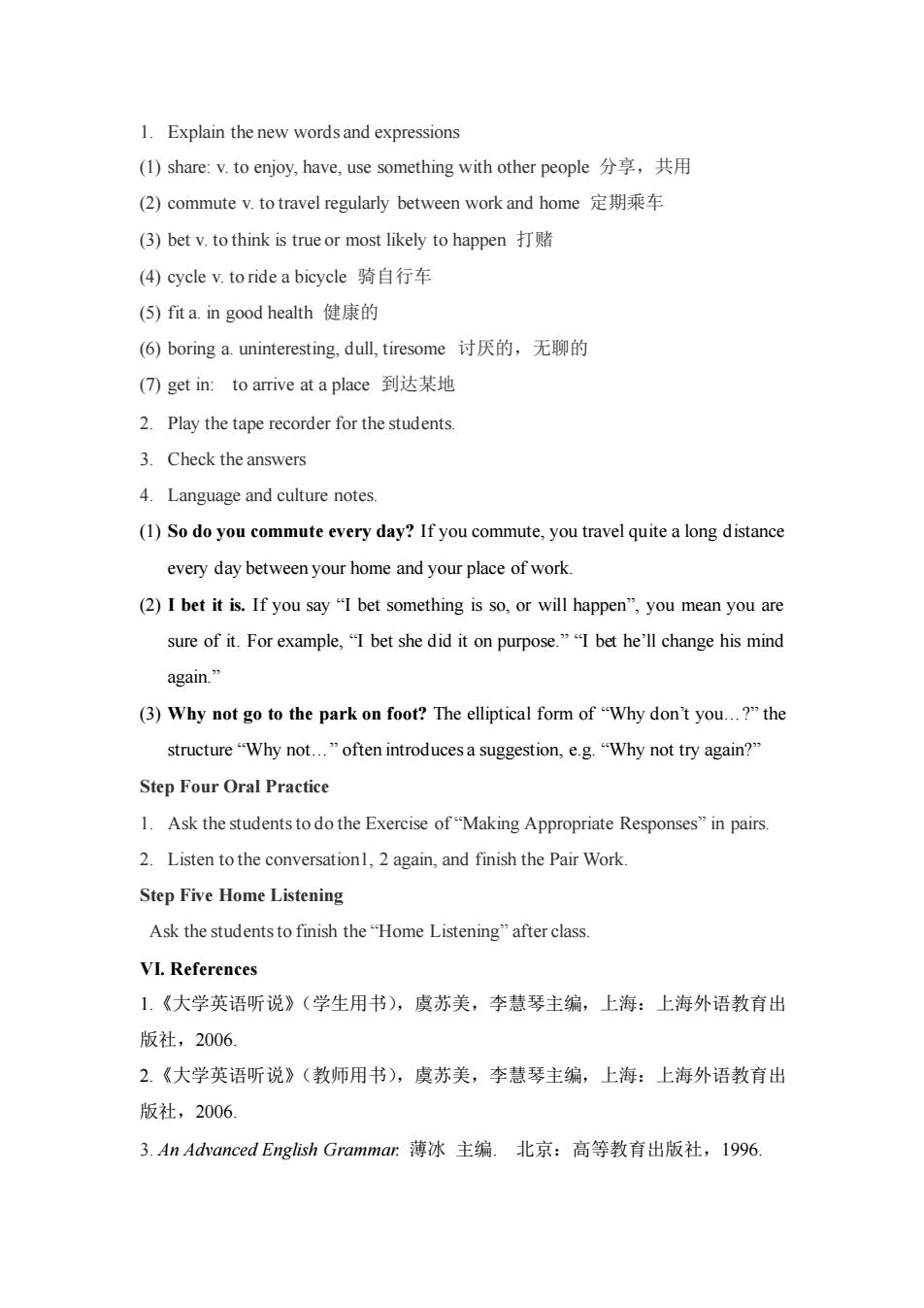
Unit9 Daily Activities(I) I.Teaching Aims 1.Master the useful expressions in this unit; 2.Train the students'listening ability to understand the main idea and grasp important details ofa text 3.Give a brief summary to the conversations; 4.Improve the student's speaking ability related to daily activities. II.Teaching Points 1.Ss are required to understand the conversations related to daily activities 2.Train the students'listening and speaking abilities. 3.Useful expressions and words:share,commute,bet,cycle,fit,boring.get in III.Teaching Methods 1.Listening and speaking activities 2.Individual,pair,or group work 3.Role-play activities 4.Explanation IV.Teaching Periods Two teaching hours V.Teaching procedures Step one Introduction Lead in to the text by asking a question -"What do you usually do when you are free?" Step Two Micro-listening 1.Play the tape recorder for the students. 2.Check the answers. Step Three Macro-listening
Unit 9 Daily Activities (I) I. Teaching Aims 1. Master the useful expressions in this unit; 2. Train the students’ listening ability to understand the main idea and grasp important details of a text; 3. Give a brief summary to the conversations; 4. Improve the student’s speaking ability related to daily activities. II. Teaching Points 1. Ss are required to understand the conversations related to daily activities. 2. Train the students’ listening and speaking abilities. 3. Useful expressions and words: share, commute, bet, cycle, fit, boring, get in III. Teaching Methods 1. Listening and speaking activities 2. Individual, pair, or group work 3. Role-play activities 4. Explanation IV. Teaching Periods Two teaching hours Ⅴ. Teaching procedures Step one Introduction Lead in to the text by asking a question —“What do you usually do when you are free?” Step Two Micro-listening 1. Play the tape recorder for the students. 2. Check the answers. Step Three Macro-listening

1.Explain the new wordsand expressions (I)share:V.to enjoy,.have,use something with other people分享,共用 (2)commute v.to travel regularly between work and home定期乘车 (3)bet v.to think is true or most likely to happen (4)cycle v..toridea bicycle骑自行车 (⑤)fita.in good health健康的 (⑥boring a.uninteresting,dul,tiresome讨厌的,无聊的 (T)get in:to arrive at a place到达某地 2.Play the tape recorder for the students. 3.Check the answers 4.Language and culture notes. (1)So do you commute every day?If you commute,you travel quite a long distance every day between your home and your place of work. (2)I bet it is.If you say"I bet something is so,or will happen",you mean you are sure of it.For example,"I bet she did it on purpose."Ibet he'll change his mind again..” (3)Why not go to the park on foot?The elliptical form of"Why don't you...?"the structure"Why not."often introducesa suggestion,e.g."Why not try again? Step Four Oral Practice 1.Ask the studentsto do the Exercise of"Making Appropriate Responses"in pairs 2.Listen tothe conversation1,2 again,and finish the Pair Work Step Five Home Listening Ask the studentsto finish the"Home Listening"after class. VI.References 1.《大学英语听说》(学生用书),虞苏美,李慧琴主编,上海:上海外语教育出 版社,2006. 2.《大学英语听说》(教师用书),虞苏美,李慧琴主编,上海:上海外语教有出 版社,2006. 3.An Advanced English Grammar:薄冰主编.北京:高等教育出版社,1996
1. Explain the new words and expressions (1) share: v. to enjoy, have, use something with other people 分享,共用 (2) commute v. to travel regularly between work and home 定期乘车 (3) bet v. to think is true or most likely to happen 打赌 (4) cycle v. to ride a bicycle 骑自行车 (5) fit a. in good health 健康的 (6) boring a. uninteresting, dull, tiresome 讨厌的,无聊的 (7) get in: to arrive at a place 到达某地 2. Play the tape recorder for the students. 3. Check the answers 4. Language and culture notes. (1) So do you commute every day? If you commute, you travel quite a long distance every day between your home and your place of work. (2) I bet it is. If you say “I bet something is so, or will happen”, you mean you are sure of it. For example, “I bet she did it on purpose.” “I bet he’ll change his mind again.” (3) Why not go to the park on foot? The elliptical form of “Why don’t you…?” the structure “Why not…” often introduces a suggestion, e.g. “Why not try again?” Step Four Oral Practice 1. Ask the students to do the Exercise of “Making Appropriate Responses” in pairs. 2. Listen to the conversation1, 2 again, and finish the Pair Work. Step Five Home Listening Ask the students to finish the “Home Listening” after class. VI. References 1.《大学英语听说》(学生用书),虞苏美,李慧琴主编,上海:上海外语教育出 版社,2006. 2.《大学英语听说》(教师用书),虞苏美,李慧琴主编,上海:上海外语教育出 版社,2006. 3. An Advanced English Grammar. 薄冰 主编. 北京:高等教育出版社,1996

4.牛津高阶英汉双解词典(第六版).牛津大学出版社,2004
4. 牛津高阶英汉双解词典(第六版). 牛津大学出版社,2004